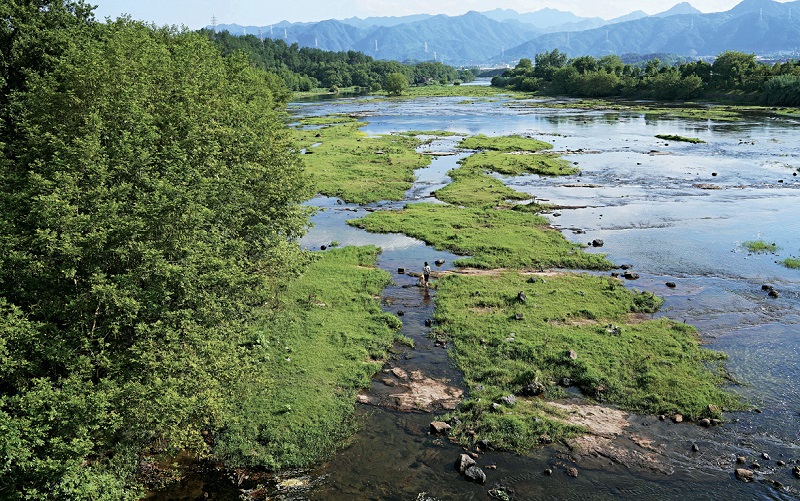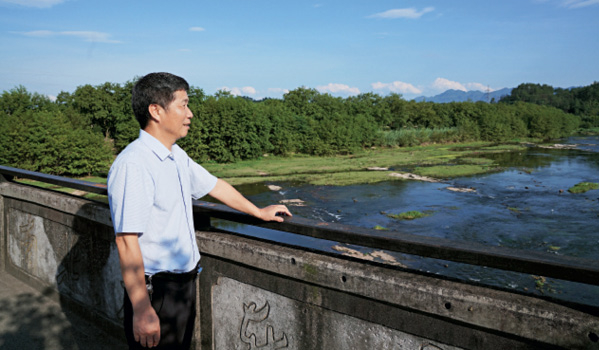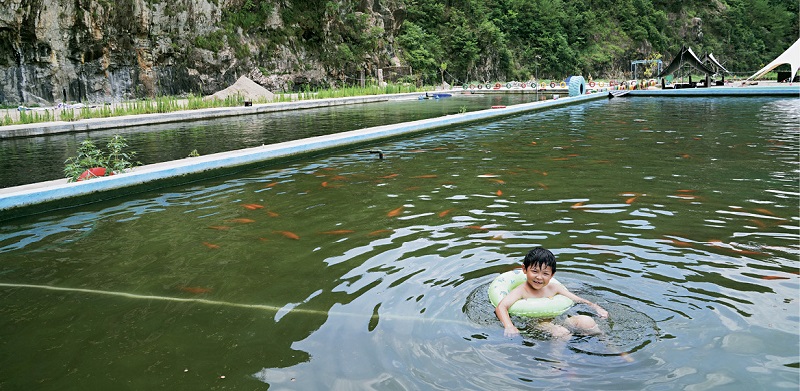The river chief system launched nationwide guarantees the effectiveness of water management in the long term, setting a direction for green development.
Every morning, Hong Guoguang walks along the river to check whether there is any sewage being discharged into the water, or if there is any garbage or floating objects in the river. A five-kilometer river patrol every 10 days is now his routine work.
Hong is the Communist Party secretary of Huangfangkou Village in Jizhai Township of Qingtian County, Lishui City in east China’s Zhejiang Province. He is also a village-level river chief. Like Hong, there are more than 50,000 river chiefs in Zhe-jiang who are engaged in the protection of rivers and lakes on a daily basis.
The river chief system covers the river protection work at the provincial, prefectural, county, township, and village levels. It was created under the Green Rural Revival Program proposed by the then provincial Party Secretary Xi Jinping in 2003. The program’s goal was to build 1,000 model villages and renovate 10,000 villages.
Over the past two decades, 50,000 km of rivers in Zhejiang have taken a new look thanks to the program. The river chief system has changed the waters from dirty to clean, making a contribution to the building of a beautiful China.

The beautiful Songyin Creek Wetland in Songyang County is a vivid interpretation of the concept “lucid waters and lush mountains are invaluable assets.”
Better Water Quality
Jizhai has a waterway running through the entire township, and is home to the Jinkeng Reservoir. In the past, local villagers usually raised poultry and littered the riverside, which consequently turned the clean river into a garbage ditch. It was a nightmare for the residents of Huangfangkou Village, since it is situated along the river, with many of their houses built near the river bank. “In those days, almost every household kept poultry. The river became dirty and smelly,” said villager Ye Xianghua.
The river chief system was first launched in Changxing County of Zhejiang’s Huzhou City in 2003, and began to be adopted throughout the province 10 years later. Under this system, Party and government leaders at all levels serve as river chiefs, responsible for the work of cleaning up the polluted waterways and restoring the ecosystem.
In 2014, the local government of Jizhai Township began a comprehensive clean-up of the river. Key leaders of the township and villages served as river chiefs and led the work of river dredging, pollution control from livestock and poultry breeding, and garbage disposal. The river has been transformed from a body of black smelly water full of floating garbage into a scenic waterway.
Bulletin boards were set up along the river, displaying information about the river, its river chief, management goals, and supervision phone number. Villagers can contact the river chief whenever they find any problems with the river. And progress in the river’s clean-up has been included into the assessment of the local official’s performance.
“After years of river management, the waters have become clearer and the air is fresher. Now we do morning exercise at the riverside every day,” said Ye.
Changes can be seen everywhere in Zhejiang Province, which has numerous rivers and well-developed water systems. Its 80,000-plus rivers of various sizes have irrigated its vast farmland and nourished generations of people. Though the rapid economic development in the past led to pollution in the water and environment, the province took water renovation as the starting point in its transition to green development. The river chief system has been applauded as a long-term management mechanism and a successful experience of Zhejiang in this aspect over the past two decades.

Li Chaosheng, senior engineer of Songyang County Water Conservancy Bureau, is pleased to see the improved conditions of the Songyin Creek Wetland after years of river management.
Balanced Growth
In Huangfangkou Village, there is a large grouper farm where dozens of barrels with a diameter of six to eight meters are placed in a sequence. The crystal water from the local river slowly flows into the barrels and the fry swim happily inside. It is one of the sites for the fish farming project which aims to explore ways to protect the environment while driving the economic growth through the utilization of clean water.
The clean-water fish farming project was launched in Jizhai Township in 2021, with a planned investment of RMB 7 million. It was co-funded by a township government-led company and a private breeding base, with investment from local villages. Unlike traditional high-density fertilized-water fish farming, the clean-water fish farming method utilizes high-quality tailwater of the Jinkeng Hydropower Station for breeding. Manure or fertilizers are not used in the entire process. The method hence boosts the sound development of both the aquatic environment and fish farming industry.
“We raised more than 400,000 groupers, most of which have been reserved in advance by customers,” said Ye Genyong, manager of the breeding base, adding that the farm is expected to produce 25,000 kg of groupers per year, with annual sales of more than RMB 3 million, which can increase the income of the Huangfangkou village collective by RMB 240,000 per year. In the future, an agricultural park featuring “water economy” will be built with indoor fishing and farmhouse entertainment facilities.
The Zhejiang model of utilizing water resources, protecting water ecology, and invigorating the “water economy” has helped build a high-quality water industry in the province that integrates aquaculture, cultural tourism, and high-end aquatic products, benefiting local people.

In midsummer, children play in the fish farm of Huangfangkou Village, Jizhai Township. Photos by Yu Xiangjun
From Beautiful to Prosperous
The 120-km green belt along the Songyin Creek’s embankment is a good place for local residents to get close to water. There are also laundry docks, drainage channels, and fishing spots. Li Chaosheng, senior engineer of Songyang County’s Water Conservancy Bureau in Lishui City, said that the ultimate goal is to let the public share the ecological dividend of water management.
Flood prevention is a major part of the water governance project in Zhejiang Province. As the largest river in Songyang County, the Songyin Creek has nourished the local residents for thousands of years. However, due to the damage to the ecological environment, the dam on the river has broken several times, damaging farmland and making the water body muddy.
Starting in 2000, the county government has reinforced the local flood control system, using erosion-resistant materials such as concrete blocks and strip stones. However, the hard concrete dam destroyed the aquatic habitat, badly affecting the survival of aquatic plants on the river bank; and the high embankment structure also blocked residents’ access to the river. The flood control project received negative comments from the public.
“At that time, people called the city’s flood control embankment an “iron wall,” as it blocked people’s access to the river. Even frogs could not jump ashore anymore,” Li said, noting that they had to readjust the strategy to make the people really benefit from the harmonious coexistence between humans and nature.
Over the following two decades, the Water Conservancy Bureau in Songyang amended their approach to boost nature rehabilitation. First, they adjusted the design of embankments to build a water system complete with lakes, ponds, beaches, banks and islands, with plenty of space for aquatic habitats. Meanwhile, efforts were made to keep the appearance of the rivers as original as possible.
Nowadays, the flood embankment has taken a new look, serving as the waterfront green belt with areas for people to walk, socialize, and enjoy a view of the river.
Chen Zengwei, director of the local Water Conservancy Bureau, believes that water management is not an overnight task. “By comprehensively improving the water environment, we can make it a boon for the people’s life. Only then can it win public support and participation.” 
(Wang Lijin, a reporter with Zhejiang’s Lishui News Media Center, also contributed to this article.)